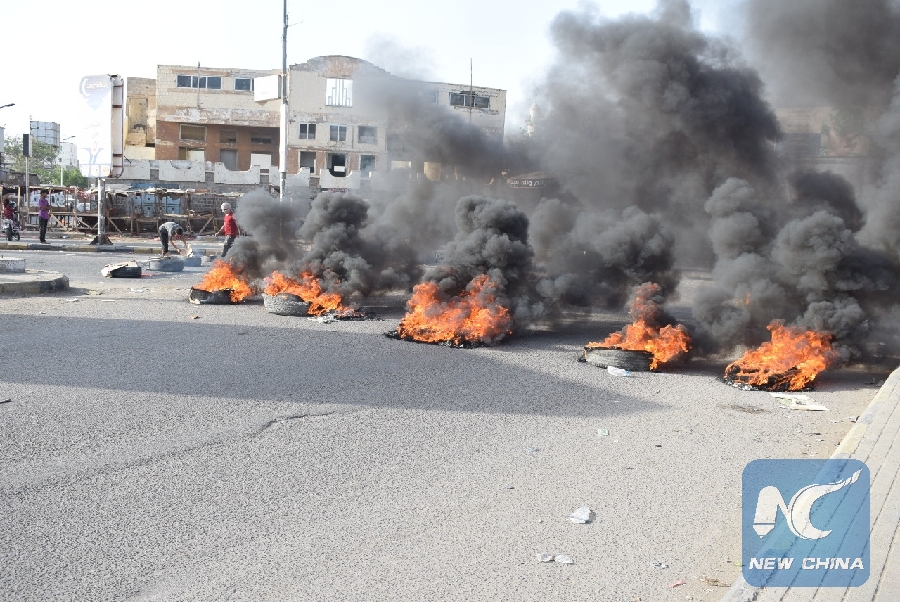
Shops and local companies remained closed across Aden as citizens and traders held a general strike to pressure the internationally-backed government. (Xinhua/Murad Abdu)
by Murad Abdu
ADEN, Yemen, Sept. 2 (Xinhua) -- Traders in the southern port city of Aden held a general strike in protest against the collapse of the Yemeni riyal and the skyrocketing prices of basic commodities.
Early on Sunday morning, shops and local companies remained closed across Aden as citizens and traders held a general strike to pressure the internationally-backed government.
People in a number of other provincial capitals controlled by the government also organized anti-government demonstrations, demanding economic solutions for the sharp depreciation of the country's national currency.
Angry protesters blocked the main streets in Aden with burning tyres and rocks, forcing government institutions to stop working.
Many stores and wholesalers in Aden city confirmed to Xinhua that they opted to shut their doors rather than selling imported products at loss.
Owners of exchanges companies and commercial banks in Aden also joined the strike and closed their doors in protest against the currency crisis that reached the critical point.
Following about four years of deadly military conflict, the depreciation of Yemeni riyal continued in recent days. In the street markets in Aden, where the Saudi-backed government is officially based, 1 U.S. dollar was traded for 623 riyals, up from 215 riyals compared with the rate before the war.
With the sharp devaluation of the local currency against major foreign currencies, prices of basic commodities witnessed hikes, worsening the economic woes and leaving many citizens in destitute in the war-ravaged Arab country.
Due to difficult living conditions and surging food prices, millions of people, observers said, will suffer more in the next few months.
Humanitarian organizations say over 80 percent of people in Yemen need humanitarian aid and over 7 million people are suffering from famine.
Political activists in Aden urged Saudi Arabia and the other Gulf countries to support the Yemeni economy and save citizens from starvation.
"Our neighbors have the ability to rescue our country and they should move immediately. Saudi Arabia must do something to help Yemenis economically," said Ahmed Fuad, an activist in Aden.
"The currency crisis will create more complicated problems in Yemen that will definitely affect the neighboring Gulf countries," Fuad said, adding Yemen needs economic support instead of military and "it's time to end this ugly war because more catastrophes are looming."
The impoverished Arab country has been locked into a civil war since the Iranian-backed Shiite Houthi rebels overran much of the country militarily and seized all northern provinces including the capital Sanaa in 2014.
The internal military conflict between the Iranian-backed Houthis and the Saudi-backed Yemeni government recently entered its fourth year, aggravating the suffering of Yemenis and deepening the world's worst humanitarian crisis in the country.
Last year, the Yemeni government floated the national currency, a move economic observers and analysts said was not well-studied a year after the relocation of the Central Bank to Aden.
The Yemeni economy is continuing to suffer after all exports were halted following a blockade on the country which was part of a Saudi-led military intervention in March 2015. The blockade has also largely restricted imports.
All investments, including oil and gas projects, whose revenues used to contribute more than 70 percent of the state budget, were shut down.
Flow of foreign cash has stopped almost completely and widespread corruption within the government institutions is among the many problems that deepen the economic misery.

